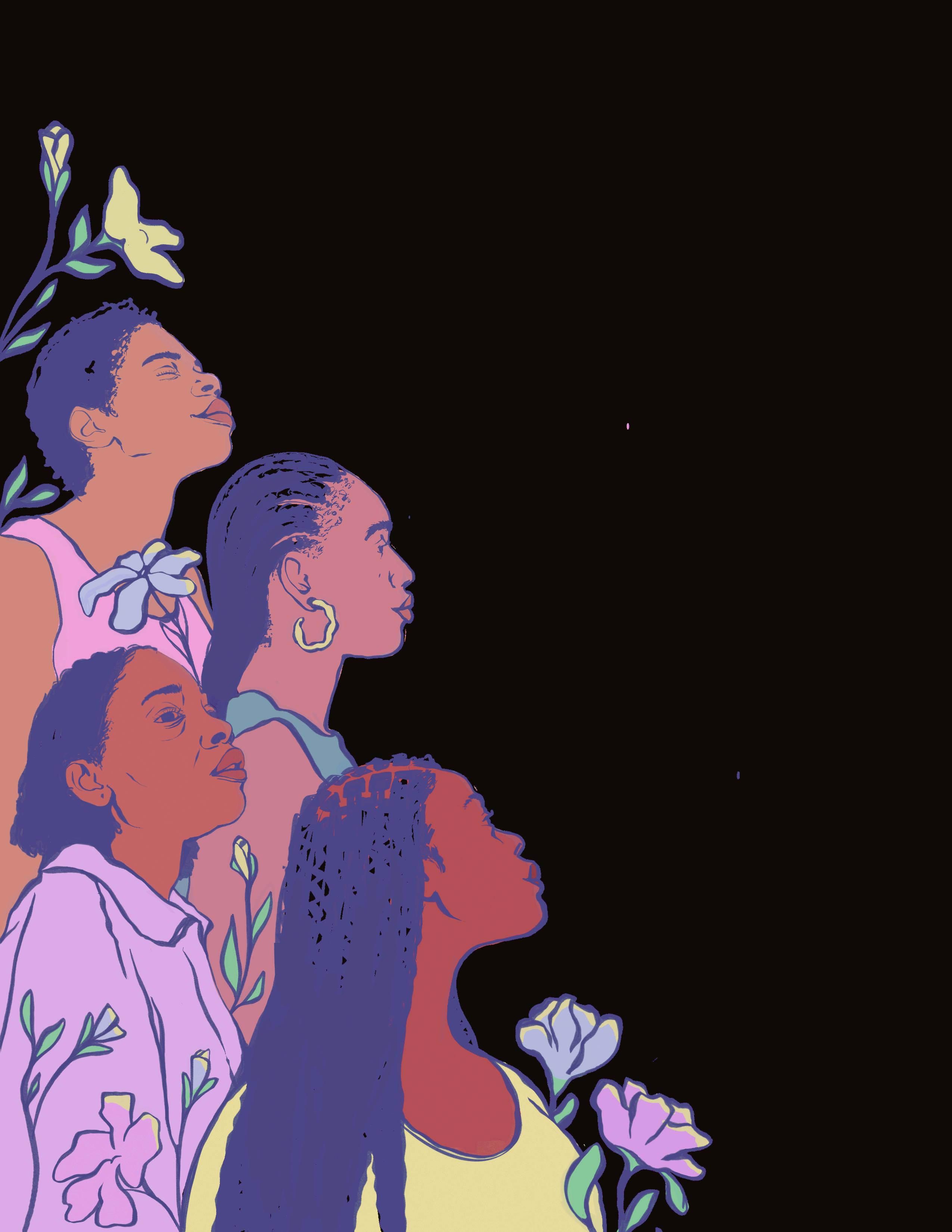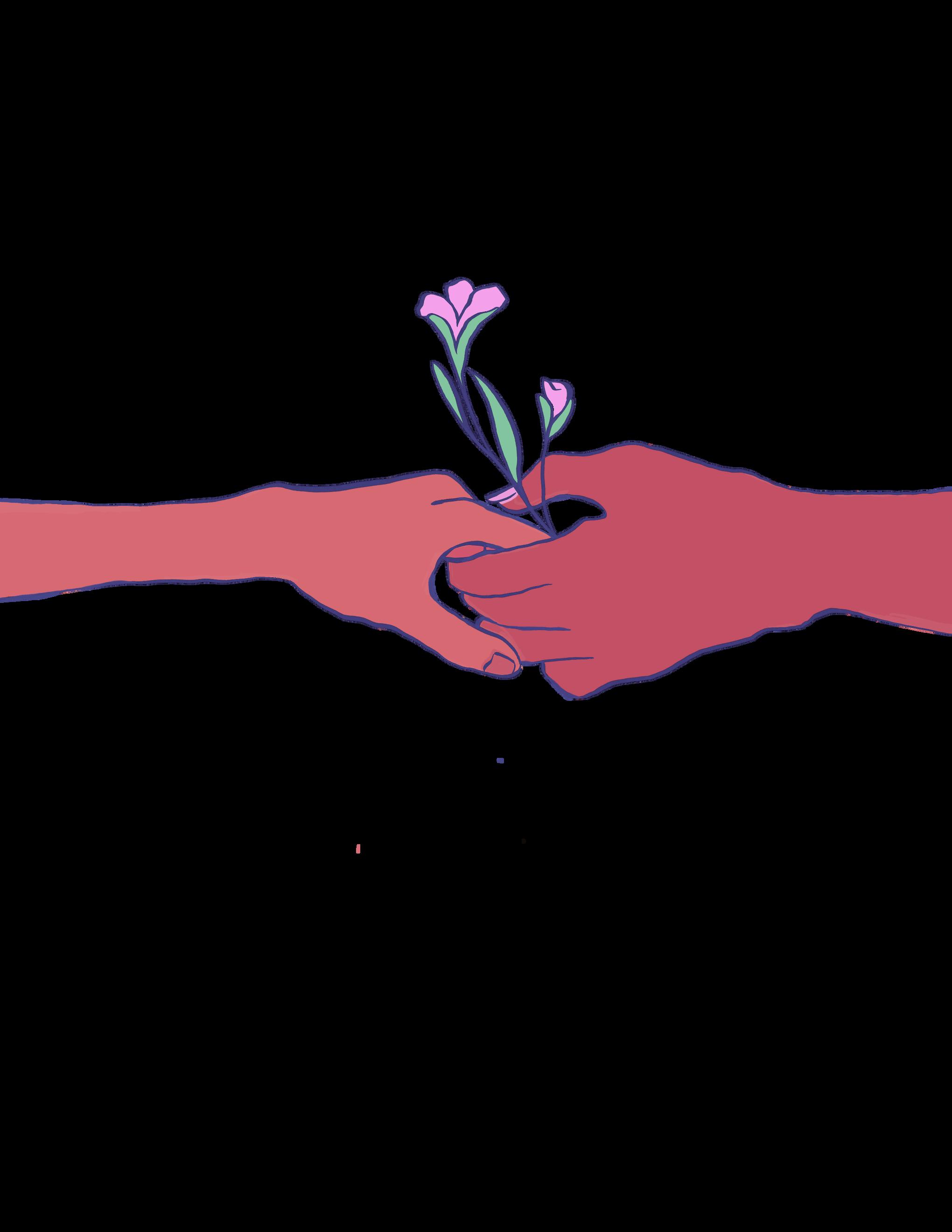SISTER SUPPORT

RESOURCE GUIDE for
INTIMATE PARTNER VIOLENCE

IN PARTNERSHIP WITH




IN PARTNERSHIP WITH

GirlTREK is committed to saving Black women’s lives. We are dying earlier and more often than any other demographic, not just from preventable diseases but also from gun violence and suicide Our mission is to increase life expectancy for Black women and that includes ending violence against Black women and girls According to the Centers for Disease Control, intimate partner violence is a significant public health issue One in five homicide victims are killed by an intimate partner, and over half of female homicide victims are killed by a current or former partner The CDC reports that there are other negative health outcomes associated with intimate partner violence, including conditions that affect the heart, muscles and bones, and the digestive, reproductive, and nervous systems, many of which are chronic
Intimate partner violence is abuse or aggression that occurs in a current or past romantic relationship, and is also known as “domestic violence” or “domestic abuse ” This abuse can range from one episode of violence to chronic and severe episodes over multiple years and includes physical violence, sexual violence, stalking, psychological aggression and financial abuse
Black women are experiencing domestic violence at high rates, with more than 40% of us experiencing domestic violence in our lifetime Additionally, Black women comprise 14% of the U S population and 31% of domestic violence fatalities We are statistically 3x more likely than white women to be killed by an intimate partner (Violence Policy Center, 2022)
We know these statistics intimately We have lost three women in the movement to intimate partner violence They are our sisters We carry their names with us every day, and we do this work for the millions of Black women like them
GirlTREK has partnered with Ujima, the National Center on Violence Against Women in the Black Community, to raise awareness about domestic violence and provide tools and resources to our members
Structural racism, generational trauma, and gender-based oppression have created significant barriers for Black women seeking to protect themselves from domestic violence Organizations like Ujima are working on the frontlines to end violence against Black women and girls As experts on intimate partner violence, Ujima helped us to build this guide They bring a unique perspective to this public health crisis as a Black woman-led organization, and they use a culturally competent and trauma-informed approach to this work that is essential Their insight has been invaluable and we are grateful for their partnership
In this guide you will find tools and resources to help you navigate an unsafe relationship. If you are in immediate danger, please consider calling 911. If an intimate partner frightens you through coercion, intimidation or physical violence, help is available. Call the National Domestic Violence Hotline at 800-799-7233 / TTY 800-787-3224 or you can call or text the StrongHearts Native Helpline at 844-762-8483 for assistance

Powered by the love of Black women who walk out of their front door every day in solidarity, we’ve built a life-saving sisterhood We want you to know that you are not alone We are here for you There’s a global collective of Black women waiting to walk alongside you, virtually or otherwise, as you heal
IFYOURRELATIONSHIPISUNHEALTHY,VIOLENT,AND/ORDISRESPECTFUL:
It is not your fault
Your abusive partner has spent a lot of time and energy telling you that you are to blame for their violence. They have spent a lot of time keeping you from the warmth of family and friends This was to keep you trapped You deserve love, dignity, and safety
Tell someone you can trust
Do you have a best friend? A family member? A faith leader? A neighbor? Who can you turn to that will tell you it is not your fault? Who has seen what you’ve been going through and wants to be there for you, without judgment? People in our circles can be helpful Some can be hurtful Go to the helpful ones If there is no one for you to turn to, call The National Domestic Violence Hotline at 800-799-SAFE (7233).

Get to a safe place
You may just need a minute to clear your head and think You may need a place to lay your head for a night You may need housing for a month or more We have included some resources at the end of this guide to help you find that safe place You can get help from advocates to create a safety plan to protect you from further harm
Consider your options
You may want to get an order from civil court to keep your abusive partner away from you, especially if your partner possesses a firearm These orders may be called different things depending on where you live, e g civil protection order, protective order, restraining order, stay away order, or no contact order They are orders by a court of law that says your partner must have no contact with you and stay away from you for a period of time if you meet certain criteria The order can outline housing, financial support, custody, and other matters You do not need an attorney to get an order of protection you can do it on your own Many domestic violence programs and courthouses have pro se (represent yourself) packets to help you The order also requires your abusive partner to give up any firearms they have
You may want to file criminal charges You may have three options to choose from: reporting to the police, asking the prosecutor to file charges, or filing charges yourself You have the option of filing for a

civil protection order and criminal charges. You do not have to choose one or the other. If you are married, you can also file for divorce on the grounds of abuse in order to receive relief. If you are not married, but have children in common, you can also address custody, visitation, and support on the grounds of abuse to assure there is no contact if that is in the best interest of the children.
Remember that protection orders alone do not keep you safe Be sure to also speak with an advocate to create a safety plan
Protect the bag
If you need to take time off from work, know your employer’s leave policies, flexible work options and other accommodations, confidentiality agreements with employees, the Employee Assistance Program (EAP), and any other company provided resources that can help you with your safety plan. Safeguard any financial accounts your abusive partner may have access to like shared bank accounts, rent/mortgage, direct deposit, government benefits, credit cards, and tax information. If you are a victim of financial abuse or the criminal nature of the abuse (i.e., malicious destruction of property) you may be entitled to victims compensation through your state.
Use technology wisely
Technology can help with your safety plan and it can also be risky Creating a technology safety plan that covers devices and social media is very important Here are some tips to keep you safe:
Cell phones and GPS in our cars may allow your abusive partner to track your location Turn off tracking features on your phone and car
Clear your browsing history from services and search engines like Google Chrome, Safari, and Explorer so your location is more difficult to find
Change passwords, locks, and phone numbers if possible
Be careful when you are posting photos, sharing your status, and using social media. When creating content on social media, make sure not to post your location Remind your friends and family to not “tag” you in photos The sites might expose you or your location You want to be careful not to create a digital footprint that can be followed Be sure to unfriend/unfollow/block your abusive partner on all of your platforms
There is no judgment! You might go back to the abusive relationship Leaving a violent partner is a process, not a single act You may feel that your partner has changed or you may feel it is safer to be with them than to not know where they are Keep your safety plan confidential and have important papers in a “go” bag where you can get to it if there is a violent incident You are the best person to keep yourself safe
Your journey is yours. Love yourself.
Whether you stay or whether you go, taking care of yourself is crucial Find moments to rest, breathe, and ground yourself emotionally Go for a walk, journal, listen to music, or just touch grass, whatever helps you feel like returning to yourself Domestic violence can lead to serious mental and physical health issues Do not feel ashamed to reach out for professional help

Check
You have fun with your partner.
You always feel safe when you are together.
You trust your partner and your partner trusts you.
Your partner supports your goals in life.
Your partner listens to your opinion.
You have equal decision making in your relationship.
You control your own money.
You give each other privacy.
Your friends and family are happy about your relationship.
You never feel pressured about sex.
Birth control is your decision.
You are proud to be with your partner.
You are able to solve conflicts without drama or threats.
You are free to make plans without having to justify every move.
Posting your relationship on social media is your choice.
You can rely on your partner.
You receive and give gifts out of affection.
You encourage each other’s interests.
You communicate without causing harm to each other.

C H E C KI N A N D c h e c ku p
Your partner gets extremely jealous and accuses you of cheating.
Your partner yells at you/treats you like a child.
Your partner talks over you/loud-talks you.
Your partner criticizes your family and friends.
Your partner coerces you into sex.
Your partner puts you down by calling you out of your name, curses at you.
Your partner uses drugs or alcohol as an excuse for hurting you.
Your partner withholds affection or gives you the silent treatment.
Your partner tells you what you can/cannot wear, how to wear your hair, etc.
Your partner decides if you use birth control.
Your partner wants you to be only with them and limits your time with others.
Your partner tracks your movements through an app.
Your partner questions you about your social media accounts and followers.
Your partner controls the money in the relationship.
Your partner grabs, pushes, hits or physically hurts you.
Your partner cheats or threatens to cheat.
Your partner threatens to harm you or harm themselves if you leave the relationship.
Your partner jeopardizes your job or education.
Your partner threatens to take your kids away if you leave.

C H E C KI N A N D c h e c ku p
Our bodies tell stories. They tell the weight of poverty and abus
Unprocessed trauma and abus incidences of heart disease in B bodies as high blood pressure a leading causes of early death fo GirlTREK is intentionally focuse Taking 30 minutes a day to wa decreases the symptoms of de space for Black women to conn
cardiovascular systems. In fact, researchers say loneliness is deadlier than cigarette smoking.
At GirlTREK, our mission is to connect Black women so that no woman feels alone in her journey In the last section of this guide, we have provided a number of mental health resources that can help you navigate this difficult time You can also join a GirlTREK crew to start walking Find women in your community here



Family and friends of survivors often struggle with feelings of anger, helplessness, guilt, and sometimes even shame Abusive relationships are complex and it is difficult for family and friends to balance the urge to protect with respecting the survivor’s choices. Leaving an abusive relationship is the most dangerous time for a survivor. Ujima has provided a list of dos and don’ts for family and friends of survivors.
Validate their feelings and experience Some suggestions include: “I’m so sorry this happened ” “It’s normal for you to feel this way ” “I believe you ” “This is not your fault ”
Ask “How can I best support you?”
Asking for help can be scary when you are in an abusive relationship It is also a dangerous time Remember, they are the expert in their journey Helping a survivor meet their immediate and basic needs like clothing, food, emergency housing, and access to a safe phone, can be the first step to safety Be honest with them and yourself about your limitations in providing support Overpromising could make the survivor feel let down or even confirm what they may have been told by their abusive partner like “No one is really going to care No one is going to be there for you ”
Offer options, not advice
Offering options instead of advice allows the survivor to reclaim the power to make their own decisions Being a support while they make their own choices is much more useful to survivor resilience than telling them what to do The abusive partner did that
Survivors have the right to share their stories, on their own terms. If the survivor hasn’t shared with the church, don’t share their story with the congregation without consent. It is important to remember that the survivor should be the one who decides who, how, and when their story is told. You may lose trust if the survivor feels like you’re gossiping.
Some immediate safety precautions you can explore with the victim include access to a safe phone, Wi-Fi, and housing Know local emergency housing, hotlines, and local domestic violence advocates in your area The survivor may not choose to use these options, but as their safe person, you’ll be providing them with life-saving information We have provided some helpful resources in the last section of this guide.
Sometimes survivors just need a ride and a person to wait in the car while they go in to an appointment Sometimes survivors want you to sit with them in the lobby and laugh with them to distract them from their nerves Sometimes survivors want you to sit in the room with them or perhaps not attend at all Be willing to show up how and when the survivor asks you

Check in with them
If a survivor shares their story with you, they value you, your thoughts, and your opinions
Survivors need consistent support throughout their journeys If you are supporting a survivor and feel that you need a break to recharge, be sure to tap back in or reconnect with them once you are refreshed Survivors are often facing isolation within their relationships, rebuilding and/or strengthening their social and family networks is key!
Take care of yourself
Hearing a survivor's story can be traumatic When supporting a survivor, you may experience compassion fatigue that shows up as anxiety, depression, and a lack of caring or withdrawal It is incredibly important that you take care of yourself in order to be there for the survivor long-term
Intentionally engaging in self-care will allow you to be a better support system for yourself and others
Victim blame
Black women are expected to be superwomen who are indestructible and fearless Validate their experiences, and allow them to be vulnerable
Act like an expert
If the survivor is looking for more formal support, make referrals you are not the expert, even if you are informed It is perfectly okay to not have all of the answer Th i i lif not be looking for that from you If they need help, refer them to d culturally specific domestic violence organizations near you If you national organizations like Ujima that can connect you to program
Avoid the survivor or drastically change your behavior toward Some survivors want the feeling of normalcy and their routines to friendships.
Urge them to take action or not to take action
The survivor has control over their story and the next part of that offer a listening ear, but the decision is the survivor’s to make
Listen to understand, not respond
Refrain from offering solutions Ask your loved one how they’d li be supported
Show respect for one’s religious or cultural practices as a healing method

Offer support by visiting with the survivor, watch their children for a period of time, cook meals, or offer assistance with daily tasks
Sit with the survivor where they are in their situation Don’t judge


We have carefully curated a list of resources to empower and uplift members who may be navigating a toxic or unsafe relationship that has led to violence, or may lead to violence. We hope you find solace in knowing you are not alone.
If you know someone who is experiencing relationship abuse, please share these resources. You can also learn more about domestic violence and how to help someone you love.
Ujima is working to build a world where Black women and girls live free from violence They work deeply in communities to support survivors of violence and increase awareness Learn more about Ujima and find additional resources here
National Domestic Violence Hotline
If you are experiencing domestic violence, seeking resources or information, or questioning unhealthy aspects of your relationship, you can call 800-799-SAFE (7233) or text START to 88788 for support Learn more at https://www.thehotline.org/get-help/.
The National Resource Center for Domestic Violence has a number of safety tips for anyone experiencing domestic abuse, including tips for using technology if you think your activities are being monitored by a partner Learn more at https://nrcdv.org/DV-safety-tips
Black Women Revolt Against Domestic Violence
Black Women Revolt Against Domestic Violence is a grassroots movement started by Black women They work to remove barriers for Black women who have experienced domestic violence and create spaces to help survivors heal as they recover from abuse They also provide training for anyone interested in learning how to become a domestic violence advocate For more information, visit blackwomenrevolt.org
FreeFrom
FreeFrom has an ecosystem of support for survivors of domestic violence to ensure that they have the resources to get safe, heal and prevent future harm. This includes peer to peer support groups and programs like the Survivor Safety Fund which helps survivors build economic power. Learn more here.
GirlTREK
Those who cause harm often try to isolate their partner Build community with GirlTREK Learn more about this powerful sisterhood at girltrek.org If you’re in a non-emergency situation and you need someone to talk to, or help finding resources, you can reach out to us at care@girltrek.org

Financial Resources and Information
Financial abuse occurs in 99% of domestic violence situations There are a number of organizations that can help survivors leave an abusive partner and provide survivors with financial assistance so that they can rebuild their lives You can find more information about financial abuse here
Partnership Against Domestic Violence - Financial Assistance
The Allstate Foundation “Moving Ahead” Financial Empowerment Resource
Salvation Army Domestic Abuse Assistance – Emergency Housing Assistance
DomesticShelters.org – Emergency Housing Assistance
Steps to End Domestic Violence – Emergency Housing Assistance
Steps to End Domestic Violence – Legal Advocacy
National Network to End Domestic Violence
Mental Health Resources
The 988 Suicide & Crisis Lifeline
The Boris Lawrence Henson Foundation
The Crisis Text line
Warm Line Directories
The Loveland Foundation
Black Emotional and Mental Health Collective (BEAM)
The National Sexual Assault Online Hotline
Therapy For Black Girls
BFT - Black Female Therapists
211 United Way
National Alliance on Mental Illness
The resources shared in this guide are for informational purposes only and are not meant to replace consultation with your physician or mental health professional. GirlTREK does not endorse any of the individuals or organizations listed in this guide. Use of these resources constitutes an agreement by the users not to hold GirlTREK, Ujima, any of its employees, volunteers, or officers liable or responsible for information obtained through the resources herein.
